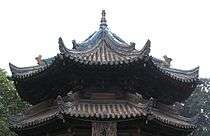The Hundred-word Eulogy
The Hundred-word Eulogy (百字讃 bǎizìzàn) is a 100-character praise of Islam and the Islamic prophet Muhammad written by the Hongwu Emperor of China (r. 1368–1398). Copies of it are on display in several mosques in Nanjing, China.[1][2]
| Part of a series on Islam in China | ||||||
|---|---|---|---|---|---|---|
 | ||||||
|
||||||
|
| ||||||
Text
It was recorded that "His Majesty ordered to have mosques built in Xijing and Nanjing [the capital cities], and in southern Yunnan, Fujian and Guangdong. His Majesty also personally wrote baizizan [a eulogy] in praise of the Prophet's virtues."[3]
Chinese
至聖百字讃
乾坤初始
天籍注名
傳教大聖
降生西域
授受天經
三十部册
普化衆生
億兆君師
萬聖領袖
協助天運
保庇國民
五時祈祐
默祝太平
存心真主
加志窮民
拯救患難
洞徶幽冥
超拔靈魂
脱離罪業
仁覆天下
道冠古今
降邪歸一
教名清真
穆罕默德
至聖貴人
穆罕默德
清真北寺
Chinese (with punctuation in paragraph form)
《百字讚》寫道:"乾坤初始,天籍注名。傳教大聖,降生西域。授受天經,三十部冊,普化眾生。億兆君師,萬聖領袖。協助天運,保庇國民。五時祈祐,默祝太平。存心真主,加志窮民。拯救患難,洞徹幽冥。超拔靈魂,脱離罪業。仁覆天下,道冠古今。降邪歸一,教名清真。穆罕默德,至貴聖人。”(《百字讚》[4][5][6][7]
English
Since the creation of the universe
God had already appointed his great faith-preaching man,
From the West he was born,
And received the holy scripture
And book made of 30 parts (Juz)
To guide all creations,
Master of all rulers,
Leader of the holy ones,
With support from the Heavens,
To protect his nation,
With five daily prayers,
Silently praying for peace,
His heart directed towards Allah,
Giving power to the poor,
Saving them from calamity,
Seeing through the Unseen,
Pulling the souls and the spirits away from all wrongdoings,
Mercy to the world,
Transversing the ancient, Majestic path,
vanquishing away all evil,
His religion, Qing Zhen (the name for islam in chinese (especially at that time), which literally means Pure and True),
Muhammad, The Noble Great One.
Alternate Translations
"One Hundred Words of Praise," a new translation by Brendan Newlon[8][9]
The universe began with the heavenly tablet recording his name.
The religion-delivering great sage, born in the western realm.
Conferring and receiving heavenly scripture in thirty parts, universally transforming all created beings.
Master of the trillion rulers, leader of the ten thousand sages.
Assisted by destiny, protector of the community. In each of the five prayers, he silently supplicates for their total well-being.
His intention is that Allah should remember the needy. Deliver them from tribulations to safety, Knower of the unseen.
Exalted above every soul and spirit, free from any blameworthy deeds.
A mercy to all of the worlds, whose path is preeminent for all time.
Renounce spiritual ignorance; return to The One – that is the religion called Islam.
Muhammad is the most noble sage.
Arabic
منذ أن خُلق الكون،
قد قرر الرب أن يعيّن،
هذا الرجل العظيم الداعي للإيمان،
من الغرب قد ولد،
ليتلقى الكتاب المقدس (القرآن(
كتابًا يحتوي على ثلاثون جزءا
ليهدي جميع الخلائق،
ملك كل الملوك،
زعيم كل القديسين،
بدعم إلهي،
ليحمي أمته،
بخمسة صلوات يومية،
بصمت يأمل حصول السلام،
قلبه متجه نحو الله،
يقوي الضعفاء،
ينقذهم من الكارثة،
يرى من خلال الظلمة،
يسحب النفوس والأرواح،
بعيدًا عن جميع الذنوب/الاخطاء،
رحمة للعالمين،
سائرًا على طريق العظماء القديم،
طاردًا لكل الشرور،
دينه نقي وصادق،
محمد،
الشريف والعظيم.
See also
References
- Tan Ta Sen, Dasheng Chen (2000). Cheng Ho and Islam in Southeast Asia. Institute of Southeast Asian Studies. p. 170. ISBN 981-230-837-7. Retrieved 2010-06-28.
- Hagras, Hamada (2019-12-20). "The Ming Court as Patron of the Chinese Islamic Architecture: The Case Study of the Daxuexi Mosque in Xi'an". SHEDET (6): 134–158. doi:10.36816/shedet.006.08.
- ()Maria Jaschok, Jingjun Shui (2000). The history of women's mosques in Chinese Islam: a mosque of their own (illustrated ed.). Psychology Press. p. 77. ISBN 0-7007-1302-6.
For instance, in the early years of Emperor Hongwu's reign in the Ming dynasty ' His Majesty ordered to have mosques built in Xijing and Nanjing [the capital cities], and in southern Yunnan, Fujian and Guangdong. His Majesty also personally wrote baizizan [a eulogy] in praise of the Prophet's virtues'. The Ming Emperor Xuanzong once issued imperial orders to build a mosque in Nanjing in response to Zheng He's request (Liu Zhi, 1984 reprint: 358–374). Mosques built by imperial decree raised the social position of Islam, and assistance from upper-class Muslims helped to sustain religious sites in certain areas
- "伊斯蘭教與中國穆斯林的形成-中文百科在線". Zwbk.org. Retrieved 2015-09-26.
- "伊斯蘭在中國". Islamhk.com. Retrieved 2015-09-26.
- "百字贊 – 王朝網路 – wangchao.net.cn". Tc.wangchao.net.cn. Retrieved 2015-09-26.
- "禦制至聖百字贊 – 王朝網路 – wangchao.net.cn". Tc.wangchao.net.cn. Retrieved 2015-09-26.
- Newlon, Brendan. "One Hundred Words of Praise: Ming Emperor Zhu Yuanzhang's Poem about the Prophet Muhammad (百字讃)". Cite journal requires
|journal=(help) - Newlon, Brendan. "Praising the Prophet Muhammad in Chinese: a new translation and analysis of Emperor Zhu Yuanzhang's Ode to the Prophet Muhammad (百字讃)". Cite journal requires
|journal=(help)